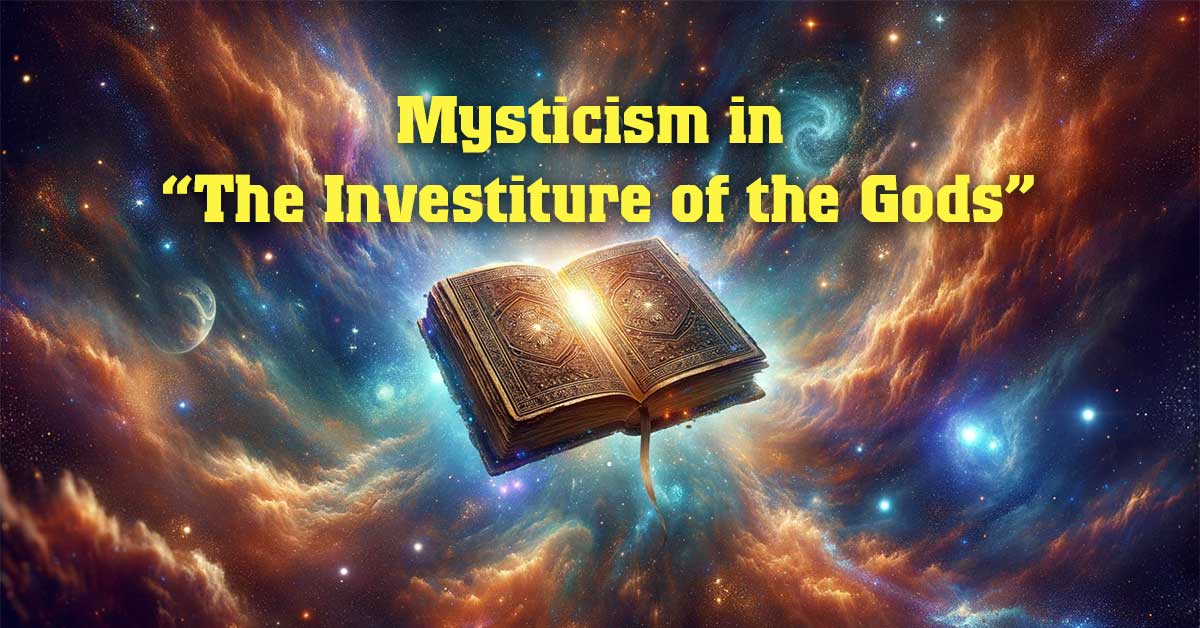This chapter is about Sir Tai Yi residing in the Golden Light Cave of Mount Qianyuan, an Immortal who has lived for over a thousand years. [According to the decree of Heaven’s court, Immortals are called upon to aid Jiang Ziya in beheading the generals from the Shang Dynasty and bestowing them with divine titles after the Zhou Dynasty overthrows the Shang, bringing peace to the people. Only then can Grand Master Yuan Shi resume teaching and Immortals continue their cultivation.] One day, as Tai Yi sits in the cave, Bai He, a young disciple, arrives and says: “Master Yuan Shi teaches that soon Jiang Shang will be born into the mortal realm, so you must ensure that Pearl Spirit is incarnated without delay.”
Tai Yi acknowledges his master’s directive, saying, “I already knew about this.”
Bai He bids farewell and departs.
During this period, Ly Jing held the position of divisional commander at Chentang Pass. In his earlier years, he had been a disciple of the Immortal Du E in Kun Lun Mountain but was subsequently expelled and later served King Zhou.
Ly Jing’s wife was Lady Yin, who bore him two handsome and intelligent sons: Jinzha and Muzha. Currently, Lady Yin was expecting her third child, but her pregnancy had extended beyond a year, causing concern. Ly Jing sighed, saying, “This pregnancy has lasted so long; I fear the child may be abnormal or some kind of demon.” Lady Yin shared his apprehension and felt helpless in the situation.
One night, she was resting in her room when she saw a Taoist with a long beard, a baldhead with two tufts of hair on the side. He was holding a cane and walking toward her. She yelled at him, “Who are you: Don’t you know the etiquette? How dare you go into my room!”
The Taoist said, “Hurry! Take this precious baby.”
Then he threw a package onto her belly. She woke up startled and sweating all over. And as soon as she told her husband about what had just happened, she began her labor and moaned in great pain. After a while, the maidservant came to announce to Ly Jing:
– Sir, Madame has just given birth to a monster!
Ly Jing was frightened and rushed into the room, sword in hand. The room was filled with fragrance and he saw a big bag the size of a wheel on his wife’s bed. He slashed it open with his sword and inside was a shining baby boy with a beautiful face that looked as if it was powdered. Ly Jing carried the baby to his wife. They both admired him with delight and handled him with extremely gentle care.
The next day, a Taoist came to see Ly Jing. As a previous disciple of the Tao, Ly Jing dared not take his guest lightly. He immediately invited the Taoist inside and respectfully asked him, “Sir, may I know which mountain you came from?”
“I am Tai Yi from the Golden Light Cave on Qianyuan Mountain. I come to congratulate you on your precious newborn. May I see your child?”
Ly Jing told the maidservant to bring the baby out to Tai Yi. Tai Yi took the baby in his arms and observed him. He asked:
– At what time was he born?
– Exactly at the hour of the Ox, Ly Jing answered
Tai Yi said:
– That is not good then.
Ly Jing asked:
– Does it mean that it would be hard to raise him?
– If he was born at that hour, he would certainly break the commandment on killing. He would be killing more than seventeen hundred lives.
Tai Yi added:
– Would you let him become my disciple in the future?
Ly Jing replied:
– Nothing is more precious than to have you care for him.
Tai Yi asked:
– How many sons do you have?
– I have three sons. The oldest one is Jinzha. He is the disciple of Wen Shu of the Five Dragons Mountain. The second one is Muzha, a disciple of Pu Xian of the Nine Palaces Mountain. If you want this one to be your disciple, please give him a name.”
– I name him Nezha, so he has the same three-letter ending as his two brothers.
Ly Jing thanked Tai Yi and ordered a vegetarian feast for Taiyi but the latter said:
– I have urgent things to do; I must go now.
Ly Jing accompanied Tai Yi out of Chentang pass.
Commentary
At that time, Grand Master Yuan Shi took on the task of teaching human beings the path to ascend to the rank of Immortal, hence he was called the leader of the “White School,” which is the orthodox faction. The Honorable Thong Thien, the Grand Master, leads the “Black School” or the faction of evil teachings, as most of his disciples are animals, trees, or stones…cultivating to become Immortals. However, due to their heavy and base nature, many become gods while very few achieve the rank of Immortal.
Grand Master Thong Thien returned from the celestial court meeting with a clear message and warning to his disciples: Many from the faction of evil teachings will perish, those who stay in seclusion and diligently recite the Ying Ding sutra will achieve the rank of Immortal, but those who argue against the Heavens and involve themselves in worldly affairs will likely lose their lives and ascend to the platform of lesser gods. That is the decree of Heaven.
When discussing Heaven’s Plan, the predetermined design of Heaven, opinions vary widely: Those who subscribe to the concept of predestination readily embrace it, often extending their belief to the extreme notion that “Each bite and each sip is predetermined by fate,” (every meal and drink is predetermined by Heaven).
Others deny the concept of predestination and the authority of divine beings, offering strong arguments to challenge the notion of a controlling deity and divine entities as personal forces capable of shaping human life.
According to Theravada Buddhism, it is believed that humanity’s inclinations toward violence, theft, immorality, deceit, slander, rudeness, foolishness, lust, desire, malice, deception, and ignorance are all products of the supreme being’s creation. Therefore, if the belief posits that a divine being is the origin of all these occurrences, then there would be no necessity for action or avoidance of such actions.
Those discerning can observe the suffering inherent in life. Why does Brahma (the Supreme Deity) not create a universe entirely beautiful, given His limitless power? Why does He seldom extend His hand to bestow blessings? Why must His creations endure suffering? Why does He not grant happiness to all? Why is life riddled with deceit and obsession? Why do greed and desire prevail over truth, while justice falters? I categorize Brahma (the Supreme Deity) among the unjust who have fashioned a flawed world (Bhuridatta Jataka Sutra).
Another passage in a separate text asserts: “If there were an all-powerful deity who both bestows blessings and inflicts misfortune upon His own creations, directing them to perform either good or bad deeds, then that deity would indeed be laden with sins. Humans merely enact His will.” (The Mahabodhi Jataka)
Even within Christian theology, a religion centered around the belief in the creation of the world by an Almighty and Omnipotent God, there exist conflicting ideas regarding the extent of God the Father’s absolute power. Some assert that God only creates goodness, while others argue that Satan has defied and betrayed God since the inception of humanity. This ongoing conflict is exemplified in the story of Eve being tempted by Satan, disguised as a serpent, to eat the forbidden fruit—a narrative that continues to symbolize the enduring battle between good and evil.
Furthermore, some priests take the notion further by suggesting that the governments of earthly nations, spanning from ancient times to the present, are under the influence of demonic forces. They see the world as engaged in an eternal struggle between Good and Evil, with no clear resolution in sight.
The following chapter, “The Devil is the Ruler of the World” (page 60), is taken verbatim from “The Truth That Leads to Eternal Life” (Watch Tower Bible And Tract Society, New York, Inc. first published 10,000,000 prints): Three times in the Bible -Book of John- we read that the Lord Jesus Christ called the Devil “the ruler of this world” (John 12:31; 14:30; 16:11). In 2 Corinthians 4:4 he is referred to as “the God of this world.” Does this mean, then, that all the nations of Earth are under the control of Satan the Devil?
The Bible answers: “The whole world is lying in the power of the wicked one” (1 John 5:19). Thus, the Devil, as “ruler of the world,” exercises great influence on man, overreaching him and even controlling political governments (Revelation 16:13, 14).
If you turn to Revelation 12:9 in your Bible, you’ll find the Devil described as “the great dragon.” In the subsequent chapter, verses 1 and 2, it’s mentioned that this dragon, symbolizing the Devil, granted power, a throne, and significant authority to what’s figuratively referred to as a “wild beast” emerging from the sea.
But what exactly does this symbolic “wild beast” represent? To understand this, let’s consider what Satan holds authority over. Remember when he offered Jesus Christ all the kingdoms of the inhabited earth? Jesus swiftly rejected this offer, but he didn’t deny that the Devil exerted influence over the political kingdoms of Earth (Luke 4:5-8).
In line with this, Revelation 13:7 describes the symbolic “wild beast” as having authority over every tribe, people, tongue, and nation. Additionally, the prophet Daniel identified certain beasts as representative of kingdoms or political governments (Daniel 7:2-7, 17, 23). The resemblance between Daniel’s vision and the “wild beast” of Revelation is striking—they both mention similar creatures: a lion, a bear, a leopard, and a ten-horned beast (Revelations 13:1, 2). Therefore, it’s clear that the “wild beast” symbolizes the Devil’s entire political structure, which has exercised oppressive control over the earth throughout history.
This sheds light on why Jesus Christ declared, “My kingdom is not part of this world,” and why his followers would likewise refrain from becoming entangled in worldly affairs (John 18:36; 17:14-16).
In contrast to the doctrines of Theravada Buddhism, which rejects the power of God and divine beings, and Christian theology, which posits that the world is governed by Satanic authorities, scholars and mystics in the Orient offer a more nuanced understanding of natural phenomena. They delve into the complexities of existence that transcend conventional logic, grappling with opposing dualities such as good and evil, light and dark, life and death, and the interplay of Yin and Yang.
While formal logic may struggle to reconcile these opposing forces, intellectuals in the East view them not as contradictory, but rather as complementary aspects of a unified whole.
The Oriental sages offer insights into resolving these dualities:
– In his work “Qiu Shui,” Zhuan Zi wrote: “Every single thing possesses dual aspects. To desire one aspect without the other, to seek order without chaos, is to misunderstand the fundamental principles of the universe and the essence of all existence. It’s akin to imagining a sky without earth, dreaming of yin without yang. Each entity embodies these two inseparable aspects. Trying to isolate these relative aspects into separate entities is truly absurd, if not outright foolish.”
– The Confucian Zhou Shi also stated in the “I Ching”: “Extreme stillness gives rise to movement, and extreme cruelty gives rise to benevolence.”
– The Dao De Jing also states: “The Dao gives birth to one, one gives birth to two, two gives birth to three, and three gives birth to the ten thousand things. Among the ten thousand things, there is not one that does not carry yin on its back and embrace yang in its arms. They blend harmoniously with each other where they meet.” Additionally, it says: “Calamity is the root of fortune, fortune is the foundation of calamity,” or “A gusty wind does not blow all morning, and torrential rain does not pour all day long.” Furthermore, it says: “When the sun sets, the moon rises; when the moon sets, the sun rises. The sun and the moon push against each other to create light. Extreme cold gives rise to heat, and extreme heat gives rise to cold. Cold and heat push against each other to create a new year.”
Certainly, upon thorough examination, we come to understand our ignorance when we lament: “Heaven and Earth have no compassion, viewing all things as straw dogs.”
These contradictions become clear when we understand that humiliation precedes glory, poverty precedes wealth, darkness precedes light, chaos precedes order, decay precedes growth, failure precedes success, suffering leads to happiness, civilization leads to decline, turbulence leads to serenity, and affliction is the root of enlightenment.”
Furthermore, consider these opposing notions: Devadatta, an adversary of Buddha, is paradoxically regarded as Buddha’s ally; Buddha’s teachings equate to secular teachings.; Life and death represent Nirvana; heavenly spirits and outsiders are Bodhisattvas; and lastly, the statement by a Zen master, “Buddha is a stick of dry shit,” exemplifies this perspective.
Only through grasping the contrasting principles cited above can we truly comprehend the significance of the conflict between the Black and White Schools depicted in “The Investiture of the Gods,” revealing it as a deliberate component of Heaven’s Plan.
Furthermore, whenever religious leaders were pressed to elucidate the origins and reasons behind the aforementioned subject (i.e., warfare), they often appeared uncomfortable and evasive, resorting to phrases such as: “Heaven’s Plan is not to be disclosed,” “Maintain respect for spiritual beings but remain aloof,” “The true essence of religion cannot be conveyed in words,” “It transcends human understanding,” “While I possess abundant knowledge, I can only share a fraction,” “Blessed are those who have faith without tangible evidence,” and similar responses.
A researcher of Mat Giao (Secret Teachings) is not obliged to adhere to any dogma before they can observe, experiment, and systematize a supernatural principle. They need to study various religious theories but must have total freedom to verify them before accepting any explanations. It is through this approach that Mat Giao can be deemed the science of supernatural studies; otherwise, it remains an unproven esoteric subject.
The mystics have directly witnessed the divine powers at work, granting blessings or bringing calamities in various real-life scenarios. Their firm convictions stem from these experiences, affirming that both God and the Divinities wield absolute authority over the fate of nations and humanity as a whole on this planet.
This authority operates according to certain reasons, which, understandably, surpass the comprehension of our limited human intellects. Nature itself doesn’t feel obligated to explain the intricacies of the celestial mechanisms to them, except perhaps to a select few prophets who have a role to play in Heaven’s Plan. Humanity needs humility to learn: Everything holds meaning, even what we deem meaningless.
Mysticism has also affirmed that omens often manifest before, during, or after the birth of individuals destined for divine missions. However, due to reverence for religious leaders, people tend to embellish their stories to the extent that they become exaggerated legends.
Additionally, the story introduces Great Wisdom Bodhisattva and Great Virtue Bodhisattva, two figures from Esoteric Buddhism, along with Tai Yi, a Taoist hermit. This inclusion serves as evidence of the author’s integration of Taoist and Buddhist elements in the novel “The Investiture of the Gods”.
Related Post
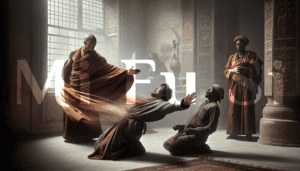
THE ENIGMATIC MONK
In 1914, when China invaded Tibet, the 13th Dalai Lama had to flee to India for refuge. This presented a...
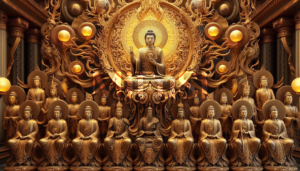
Nechung Oracle – Freedom in Exile
Dear Mystics Members, Explore an excerpt from the Dalai Lama's "Freedom in Exile." Delve into Chapter 12, "Of Magic and...
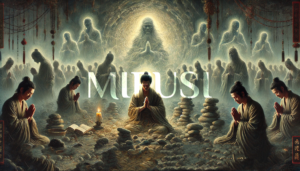
Last chance for the Holy Spirit’s Blessings
Last chance for the Holy Spirit's Blessings "Thánh Thần cứu vớt kỳ chót" posted by Bạch Hạc on 08 Dec...

GLOBAL PERIL
GLOBAL PERIL (Thế giới trên bờ vực thảm họa - by Rainbow on Thu Aug 16, 2012 - translated by...
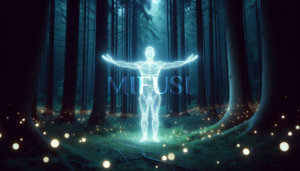
Story 10 -Mystical Practice of Invibility
Story 10 -Mystical Practice of Invibility Câu chuyện số 10 - Phép Tàng Hình by ThầyGià on 12 November 2008,...
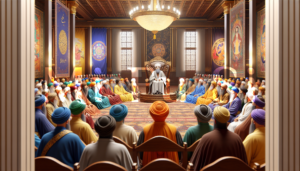
Which Religion Reigns Supreme?
Which Religion Reigns Supreme? (Đạo Hay Nhất! by như-ý on Mon Feb 09, 2009 3:05 pm Translated by Xiaobaiyun.) The...
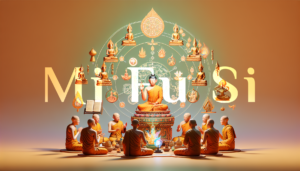
The Singular Source of Religions
The Singular Source of Religions (Tất cả tôn giáo đều cùng một nguồn gốc by DongVan on Sat Jun 26,...
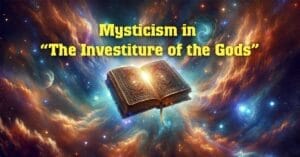
JIANG ZIYA LEAVES THE MOUNTAIN
The Supreme Ruler has assigned Grand Master Yuan Shi Tian Zun the responsibility of assessing disciples' virtues and vices, and...
